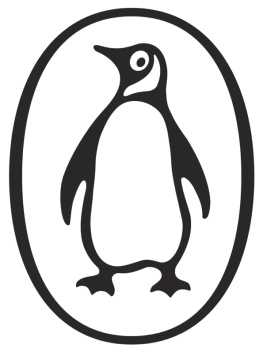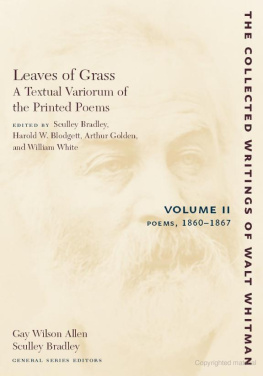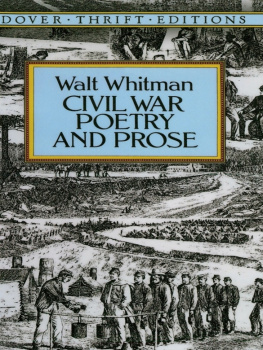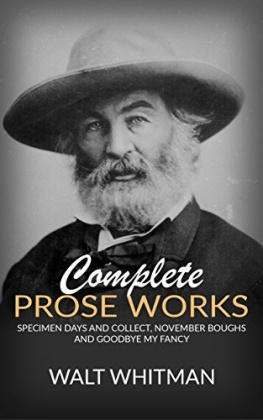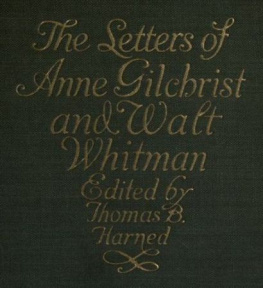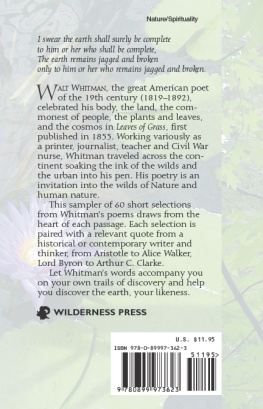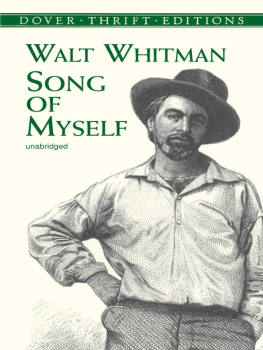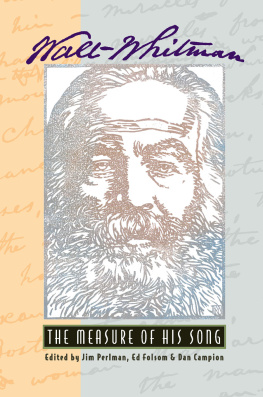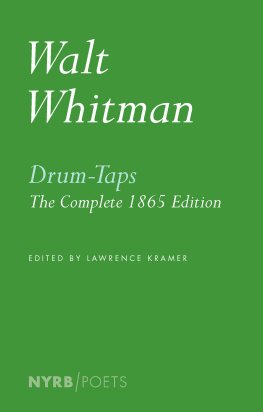
WALT WHITMAN: THE COMPLETE POEMS
WALT WHITMAN, once referred to by D. H. Lawrence as the greatest modern poet, and the greatest of the Americans, was born on 31 May 1819 in West Hills, Long Island, New York, and was brought up in Brooklyn, the son of a farmer turned carpenter. At the age of fifteen he was independent of his family and working as a journalist and journey-man printer. He taught for a short time and in 1838 founded his own newspaper. He became editor of the Brooklyn Daily Eagle in 1846. Herman Melville once said that a whaling ship served as his Harvard College; Whitmans college was the city of Brooklyn and the island of Manhattan. He loved the opera, was a frequent visitor to galleries, and an avid reader. By the time he was thirty-five he thought of himself more and more as a poet and early in July 1855 he published Leaves of Grass, probably setting some of the type himself. It contained twelve un-titled poems, a preface and a now famous portrait of the unnamed author in a workmans shirt. Although some critics treated the volume as a joke and others were outraged by its bold language and themes, the book attracted the attention of some of the finest literary intelligences. Ralph Waldo Emerson greeted him at the beginning of a great career, and told him that he found incomparable things said incomparably well.
Whitman added to, reshuffled and dropped poems in Leaves of Grass all his life. The great odes Out of the Cradle Endlessly Rocking and As I Ebbd with the Ocean of Life appeared in 1860; the great poems of the Civil War the collection called Drum-Taps and When Lilacs Last in the Dooryard Bloomd were published as annexes in 1867. The tenth edition, including posthumous poems, was published in Boston in 1897, five years after Whitmans death in Camden, New Jersey, on 26 March 1892. Whitman had purchased a house on Mickle Street eight years before, and it was here that he received the worlds visitors.
Francis Murphy is Professor of English Emeritus at Smith College, Northampton, Massachusetts, U.S.A.
WALT WHITMAN
The Complete Poems
Edited with an Introduction and Notes by
FRANCIS MURPHY
PENGUIN BOOKS
PENGUIN BOOKS
Published by the Penguin Group Penguin Books Ltd, 80 Strand, London WC2R 0RL, England
Penguin Group (USA) Inc., 375 Hudson Street, New York, New York 10014, USA Penguin Books Australia Ltd, 250 Camberwell Road, Camberwell, Victoria 3124, Australia
Penguin Books Canada Ltd, 10 Alcorn Avenue, Toronto, Ontario, Canada M4V 3B2
Penguin Books India (P) Ltd, 11 Community Centre, Panchsheel Park, New Delhi 110 017, India
Penguin Books (NZ) Ltd, cnr Airborne and Rosedale Roads, Albany, Auckland, New Zealand
Penguin Books (South Africa) (Pty) Ltd, 24 Sturdee Avenue, Rosebank 2196, South Africa
Penguin Books Ltd, Registered Offices: 80 Strand, London WC2R 0RL, England
www.penguin.com
First published in Penguin Education 1975
Reprinted in Penguin Books 1977
Reprinted in Penguin Classics 1986
Reprinted with revised Further Reading 1996
Reprinted with new Introduction and Appendix 6 2004
25
Introduction copyright Francis Murphy, 2004
Except in the United States of America, this book is sold subject to the condition that it shall not, by way of trade or otherwise, be lent, re-sold, hired out, or otherwise circulated without the publishers prior consent in any form of binding or cover other than that in which it is published and without a similar condition including this condition being imposed on the subsequent purchaser
9780141919836
Contents
Inscriptions
Children Of Adam
Calamus
Birds Of Passage
Sea-Drift
By The Roadside
Drum-Taps
Memories Of President Lincoln
Autumn Rivulets
Whispers Of Heavenly Death
From Noon To Starry Night
Songs Of Parting
First Annex: Sands At Seventy
Second Annex: Good-Bye My Fancy
Appendix I
Old Age Echoes
Appendix 2
Poems Excluded from Leaves of Grass
Appendix 3
Early Poems
Appendix 4
Appendix 5 Prefaces
Appendix 6
Acknowledgements
I would be remiss if I did not thank Christopher Ricks once again for all his original editorial advice and Laura Barber of Penguin Classics for her continuing interest in this volume.
Table of Dates
| 1819 | Born on 31 May at West Hills, Long Island. |
| 1823 | Whitman family moves to Brooklyn. |
| 1825-30 | Attends the public schools. |
| 1830-34 | Learns the printing trade. |
| 1835 | Works as a printer in New York. |
| 1836-8 | In the summer of 1836 Whitman begins teaching at East Norwich, Long Island; by the year 1838 he had taught at Hempstead, Babylon, Long Swamp and Smithtown. |
| 1838-9 | Edits the weekly Long-Islander in Huntington. |
| 1840-41 | Works for Van Buren in his presidential campaign; then returns to teaching. |
| 1841 | In May, returns to New York to work as a printer. |
| 1842-4 | Edits a daily newspaper, the Aurora; edits the Evening Tatler. |
| 1845-6 | Returns to Brooklyn and writes for the Long Island Star. |
| 1846-8 | Edits the Brooklyn Daily Eagle. |
| 1848 | In February, Whitman goes with his brother Jeff to New Orleans where he works on the Crescent; he leaves New Orleans on 27 May and returns via the Mississippi and the Great Lakes. |
| 1848-9 | Edits the Brooklyn Freeman. |
| 1850-54 | Operates a printing office and stationery store and speculates in the building trade. |
| 1855 | Early in July publishes the first edition of Leaves of Grass, printed by Rome Brothers in Brooklyn. No publishers name, no authors name. It includes a portrait of Whitman in workmans shirt. There are twelve untitled poems and a preface. The typography is the most unorthodox of all the editions. Whitmans father dies 11 July. |
| 1856 | In the summer Whitman publishes the second edition of Leaves of Grass. Fowler and Wells served as agents for the book but soon renounced all responsibility for it. The authors name is acknowledged on the cover. On the back Whitman printed a statement from Emersons letter: I greet you at the beginning of a great career. Whitman included the letter and a reply as an appendix. There are thirty-two poems, titled and numbered. The poem which was eventually to be called Song of Myself (1881) appears here as Poem of Walt Whitman, an American. In a section entitled Leaves-Droppings Whitman appended a selection of reviews of the 1855 edition. |
| 1857-9 | From the spring of 1857 to the summer of 1859 Whitman edited the Brooklyn Times. Enters what he liked to think of as his Bohemian period. |
| 1860 | Whitman goes to Boston in March to see the third edition of Leaves of Grass, published by Thayer and Eldridge, through the press. This is the first edition which Whitman did not publish himself. The firm went bankrupt in 1861 and the edition was pirated. This volume contained 154 poems. As in 1855, Whitman identified himself by including a portrait. Most of the new poems are to be found in |

